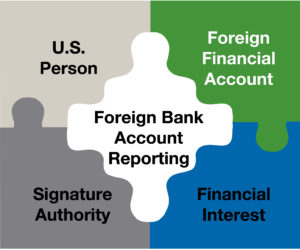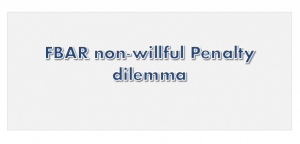Current Developments May Make It Easier For the IRS To Assess Penalties After Willfully Failing to File FBAR’s
 A taxpayer who willfully fails to file a Report of Foreign Bank and Financial Accounts (FBAR) may be subject to both civil and criminal penalties as well as imprisonment. In both the criminal and civil context, the government has the burden of proof.
A taxpayer who willfully fails to file a Report of Foreign Bank and Financial Accounts (FBAR) may be subject to both civil and criminal penalties as well as imprisonment. In both the criminal and civil context, the government has the burden of proof.
In FBAR criminal prosecutions, the standard of proof is well settled and requires the government to prove its case using the beyond a reasonable doubt standard. However, in cases involving the assessment of the 31 USC § 5321(a) (5(C) willful civil FBAR penalty, the standard of proof is unsettled and remains the subject of debate among legal scholars, practitioners and the judiciary. Practitioners have argued that the standard of proof in assessing the willful civil FBAR penalty should be the clear and convincing standard, citing Chief Counsel Advice (CCA) memorandum released January 20, 2006, CCM 200603026 (See discussion below) in support of using the higher standard of proof.
The correct standard of proof to be applied for assessing the willful civil FBAR penalty often arises in the context of an assessment of the willful civil FBAR penalty by IRS Examinations, an Appeal by the taxpayer, or in defense of an action by the U.S. government to enforce the 31 USC § 5321(a) (5(C) penalty. The proper standard of proof to apply in the context of the willful failure to file an FBAR has been the subject of a number of lower federal court decisions and is also reflected in jury instructions submitted by U.S. District Court in the Southern District of Florida. The Courts in all three cases have cited the preponderance of evidence standard as the correct standard to apply when assessing the 31 USC § 5321(a) (5(C) penalty.
Based upon two recent cases, the stage may now set for the U.S. Court of Appeals for the Fifth and Ninth Circuits to ultimately decide the correct standard of proof to be applied when assessing the31 USC § 5321(a) (5(C) penalty.
The first case, Gubser v Comm’r, 2016 WL. 3129530 (S.D. Tex. May 4, 2015) comes out of the U.S. District Court for the Southern District of Texas. In Gubser, the taxpayer filed a complaint in the District Court asking for a declaratory judgment that the proper standard to be applied in a willful civil FBAR penalty case is the clear and convincing standard. The District Court dismissed the taxpayer’s suit based upon lack of standing. The taxpayer subsequently filed an appeal.
Although the question currently before the Fifth Circuit is limited to standing, some observers believe that if the taxpayer prevails and the matter is remanded back to the District Court for further findings, the standard of proof issue to be applied in a willful civil FBAR penalty will find its way back to the Fifth Circuit.
The second case, U.S. V. August Bohanec and Maria Bohanec (Case No. 215-CV-4347 ddp (FFMx) (filed 12/8/16) involves a decision from the United States District Court for the Central District of California. In Bohanec, the Court rejected the taxpayers’ argument that the clear and convincing standard should be applied in a willful civil FBAR penalty case. Instead, the District Court applied the lower preponderance of the evidence standard of proof. The taxpayers’ attorney has indicated the taxpayers will appeal the decision.
The ultimate determination of the standard to be applied when assessing the willful civil FBAR penalty and its importance cannot be overstated; a decision by the Fifth and/or Ninth Circuits citing the preponderance of evidence as the correct standard will certainly have a chilling effect on taxpayers, who are considering opting out of the OVDP, and will also pose a greater risk to those taxpayers who have or will submit a Certification of Non-Willfulness as part of the Streamlined Procedures. If the Appeals Court finds that the correct standard is the preponderance of evidence, taxpayers can also expect the IRS to be more aggressive in scrutinizing taxpayers who opt Out of the OVDP or those who proceed using the Streamlined Procedures.
This article outlines the concept of “willfulness” in light of U.S.C. §5321(a) (5) (C), CCM200603026, JB Williams, McBride and Zwerner and in anticipation of the Gubser and Bohanec cases making their way to the U.S. Court of Appeals.
A taxpayer who “willfully” fails to file an FBAR faces a penalty equal to the greater of $100,000 or 50% of the foreign financial account balance as of the June 30 FBAR due date,31 U.S.C. §5321(a) (5) (C). Neither the FBAR statute nor the regulations promulgated there under provide any guidance on the standard of proof to be applied in the assessment of the willful civil FBAR Penalty. In Chief Counsel Advice (CCA) memorandum released January 20, 2006, analyzing the issue of willfulness in the FBAR civil context, the IRS compared the burden of proof for the willful civil FBAR penalty to the burden of proof for the civil fraud penalty under 26 U.S. Code §. 6663, explaining that it expects the standard of proof will be the same—clear and convincing evidence, not merely a preponderance of the evidence. Proponents for applying the higher standard often cite CCM 200603026 in support. Despite CCM 200603026, the U.S. District Court, in three cases has cited the lower preponderance of the evidence standard as the correct standard when assessing the willful civil FBAR penalty.
The United States District Court in JB Williams applied the preponderance of the evidence standard,United States vs. Williams, 2010 U.S. Dist. LEXIS 90794 (ED VA 2010). In JB Williams, the government brought an action in the US District Court for the Eastern District of Virginia seeking to enforce the civil willful FBAR penalties assessed against the taxpayer for his failure to report his interest in two foreign bank accounts for tax year2000, in violation of 31 U.S.C. § 5314. The taxpayer previously plead guilty to two count superseding information for Conspiracy to Defraud the IRS and Criminal Tax Evasion. As part of the plea, Williams agreed to allocute to all of the essential elements of the charged crimes, including that he unlawfully, willfully, and knowingly evaded taxes by filing false and fraudulent tax returns on which he failed to disclose his interest in the Swiss accounts.
Furthermore, the taxpayer checked “no” in response to the question on Schedule B Form 1040, regarding the existence of a foreign financial account, despite having transferred $7M to a Swiss bank account. In addition, the taxpayer completed a tax organizer, wherein he answered: “no” in response to a question as to whether he had a financial interest in or was a signatory over a foreign financial account. The taxpayer provided the following statement as part of his allocution.
“I also knew that I had the obligation to report to the IRS and/or the Department of the Treasury the existence of the Swiss accounts, but for the calendar year tax returns 1993 through 2000, I chose not to in order to assist in hiding my true income from the IRS and evade taxes thereon, until I filed my 2001 tax return.”
. . . .
The District Court, held without discussion, that the government’s burden to establish a willful violation of 31 U.S.C. § 5314only requires proof by a preponderance of the evidence.The District Court further held that the Taxpayer’s eventual filing of the delinquent FBARS, “negated” willfulness. In reversing the District Court’s decision, the U.S. Court of Appeals for the Fourth Circuit, dodging the standard of proof question, held that the District Court clearly erred in finding that the Government failed to prove that Williams willfully violated 31 USC § 5314.
In U.S. v. McBride, [908 F. Supp.2d 1186, 1201 (D. Utah 2012)], the District Court for the District of Utah Central District, relying on Williams held that the correct standard for imposition of the willful civil FBAR penalty is the preponderance of the evidence standard. Likewise, in U.S. v Zwerner, a 2014 Florida Case, the Federal District Court for the Southern District of Florida submitted the issue on willfulness to the jury using a preponderance of evidence standard.The U.S. Court of Appeals has yet to weigh in on the correct standard of proof to be applied in a 31 USC § 5321(a) (5(C) willful FBAR penalty case. However, two recent lower court cases make clear that the higher court will ultimately be called upon to determine the correct standard of proof question.
In Gubser v. Comm’r, 2016 WL, 3129530 (S.D. Tex. May 4, 2016), the taxpayer, a Swiss citizen by birth and later naturalized asa U.S. Citizen maintained a Swiss account, which he opened when he was a young man. The purpose for opening the account was to enable the taxpayer to accumulate savings for his retirement in Switzerland. Since its opening, the account was always held in Gubser’s name and the funds in the account represented after tax earnings. Grubser retained the services of a CPA, who prepared the taxpayer’s U.S. tax return for over 20 years. During this time, the CPA never raised the question whether the taxpayer had an interest in any foreign financial account. The matter first came to the taxpayer’s attention in 2010 when someone from the CPA’s office raised the question of the existence of foreign financial accounts. Gubser promptly filed an FBAR report for 2009 and subsequent years. In addition, the taxpayer entered the OVDP, covering the tax years 2003-2010. Subsequently, Gubser opted out of the OVDP, which resulted in the IRS sending Gubser a 3709 Letter (the FBAR 30 day letter), proposing the50% willful civil FBAR penalty pursuant to 31 USC § 5321(a)(5(C) for the tax year 2008. The penalty in the amount of $1.3M reflected approximately 50% of the taxpayer’s entire life savings. Grubser filed a timely protest letter with Appeals. When the taxpayer discussed the matter with the Appeals officer, the Appeals officer told Gubser that the IRS could prove willfulness by using the preponderance of the evidence standard, but not by the clear and convincing standard. The Appeals officer also asked for guidance on the proper standard.
Grubser thereafter filed a declaratory judgment action with the U.S. District Court for the Southern District of Texas, requesting that the Court declare that the IRS must prove willfulness by clear and convincing evidence. In response the government filed a motion to dismiss based upon lack of standing, arguing that the taxpayer’s injury could not be redressed by a declaratory judgment, since such a judgment would be non-binding on the IRS. The government’s motion was granted and Gruber appealed to the Fifth Circuit.
The second case to watch isU.S. V. August Bohanecand Maria Bohanec (Case No. 215-CV-4347 ddp (FFMx) (filed 12/8/16). In Bohanec, the taxpayers had previously applied for and were denied participation in the Offshore Voluntary Disclosure Program (“OVDP”), in part, due to several misrepresentations made during the OVDP process. The U.S. District Court for the Central District of California rejected the taxpayers’ argument that the government had to show willfulness under the clear and convincing standard of proof, and instead applied the preponderance of evidence standard of proof. The Court found that the taxpayers’ failure to file FBAR’s for three accounts the taxpayers maintained for over a decade was at least “recklessly indifferent to a statutory duty.” The taxpayers’ attorney has indicated that the taxpayers will appeal the District Court’s decision.
Taxpayers currently participating in the OVDP, who are considering opting out of the Program or those who are thinking of making a disclosure using the Streamlined Procedures certainly need to proceed with caution. The U.S. Court of Appeals for the Fifth and Ninth Circuits will ultimately address the correct standard to be applied in the assessment of the willful civil FBAR penalty. These decision(s) will undoubtedly have a significant impact on both current and future taxpayers who have made or are considering making a voluntary disclosure.
The takeaway here is that any decision involving making an offshore voluntary disclosure should not be made based upon an internet search. Instead, those faced with the decision of making an offshore voluntary disclosure should consult with a knowledgeable and experienced tax attorney, who can assess the specific facts of each case and assess the risks associated with choosing one method of disclosure over another. At the Law Office of Anthony Verni, we know that there is no one size solution to fit all, contact us today or leave a comment below.
© 2017 Anthony N. Verni, Attorney at Law, CPA
 The Courts have recently addressed the issue of whether the FBAR Non-Willful penalty should be assessed per form rather than per account with conflicting results. InUnited States v. Bittner, the U.S. District Court for the Eastern District Court held that the non-willful FBAR penalty should be assessed per form rather than per account. The Bittner decision is in direct conflict with the holdings in United States v. Gardner, and United States v. Boyd.In two separate decisions, the District Court for the Central District of California held that the non-willful FBAR penalty should be assessed per account.
The Courts have recently addressed the issue of whether the FBAR Non-Willful penalty should be assessed per form rather than per account with conflicting results. InUnited States v. Bittner, the U.S. District Court for the Eastern District Court held that the non-willful FBAR penalty should be assessed per form rather than per account. The Bittner decision is in direct conflict with the holdings in United States v. Gardner, and United States v. Boyd.In two separate decisions, the District Court for the Central District of California held that the non-willful FBAR penalty should be assessed per account.
 A taxpayer who willfully fails to file a Report of Foreign Bank and Financial Accounts (FBAR) may be subject to both civil and criminal penalties as well as imprisonment. In both the criminal and civil context, the government has the burden of proof.
A taxpayer who willfully fails to file a Report of Foreign Bank and Financial Accounts (FBAR) may be subject to both civil and criminal penalties as well as imprisonment. In both the criminal and civil context, the government has the burden of proof. As part of his plea, which was entered Jan. 16 2015 before Magistrate Judge Debra Freeman of the U.S. District Court for the Southern District of New York, George Landegger of Ridgefield, Conn., agreed to pay a civil penalty of more than $4.2 million and more than $71,000 in back taxes.
As part of his plea, which was entered Jan. 16 2015 before Magistrate Judge Debra Freeman of the U.S. District Court for the Southern District of New York, George Landegger of Ridgefield, Conn., agreed to pay a civil penalty of more than $4.2 million and more than $71,000 in back taxes.
